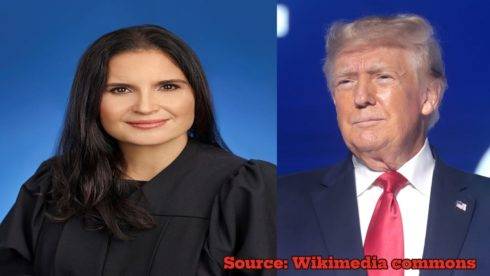Judge Aileen Cannon’s has indefinitely postponed the highly anticipated Mar-a-Lago classified documents case against former President Donald Trump. The trial, originally slated to begin on May 20th, now hangs in limbo, with key court dates pushed back to late July and no new trial date set.
Judge Aileen Cannon’s decision, particularly concerning given her appointment by Donald Trump himself, has sparked outrage and accusations of potential corruption and favoritism. Critics argue that this delay appears to be a blatant case of repaying a favor, casting a dark shadow over the integrity of the American justice system and its commitment to impartiality.
Donald Trump’s Potential Pardon and Erosion of Public Trust
The indefinite postponement of Donald Trump’s trial has raised alarming concerns about the potential abuse of power and erosion of public trust in the nation’s judicial system. If Donald Trump secures victory in the 2024 presidential election, there are growing fears that he may attempt to exploit this delay and pardon himself, effectively evading legal consequences for the alleged mishandling of classified documents at Mar-a-Lago. Such an unprecedented move would deal a severe blow to the fundamental principles of accountability and the rule of law that underpin the nation’s democratic foundations.
The mere possibility of a self-pardon has already fueled widespread doubts about the impartiality of the judicial system, with accusations of partisan loyalty and favoritism overshadowing the fair administration of justice.
Judge Aileen Cannon’s controversial decision to indefinitely postpone Donald Trump’s trial has sparked outrage and calls for accountability from legal experts, political analysts, and concerned citizens alike. The perception of a quid pro quo arrangement, where Donald Trump’s appointee appears to be repaying a favor, has eroded public confidence in the integrity of the judicial process. To restore faith in the nation’s democratic institutions, calls for transparency, impartiality, and equal treatment under the law have intensified. Only by upholding the principles of justice and accountability, regardless of political affiliations or personal connections, can the trust of the American people be regained and the sanctity of the judicial system preserved.
Uncertainty Looms Over Trump’s Trial and Potential Self-Pardon
Judge Aileen Cannon’s decision to delay Donald Trump’s trial over the mishandling of classified documents at Mar-a-Lago has cast a cloud of uncertainty over the legal proceedings. The implications of this delay become even more significant if Donald Trump manages to secure victory in the 2024 presidential election. There are growing concerns that the former president may attempt to exploit this situation and pardon himself, potentially evading legal consequences altogether.
While Judge Aileen Cannon’s has cited the need to resolve issues surrounding the handling of classified information during the trial as the justification for the postponement, this reasoning has been met with widespread skepticism. Many legal experts and observers have questioned the true motives behind the delay, fueling speculation about potential bias or undue influence in the judicial process.
Judge Aileen Cannon’s claim that the delay is necessary to address the “myriad and interconnected pre-trial and CIPA issues” has been met with skepticism from various quarters. Critics argue that this justification appears to be a smokescreen, masking ulterior motives or political considerations that may be influencing the decision-making process. The public’s trust in the judicial system hinges on transparency and impartiality, and any perceived deviation from these principles risks eroding confidence in the rule of law. As the debate continues to unfold, calls for accountability and a thorough examination of the true reasons behind the delay are likely to intensify.
CIPA Issues Cited as Justification for Trump Trial Delay
In her ruling to indefinitely postpone the trial of former President Donald Trump over the alleged mishandling of classified documents at Mar-a-Lago, Judge Aileen Cannon’s cited the need to resolve “myriad and interconnected pre-trial and CIPA issues remaining and forthcoming.” Judge Aileen Cannon stated,
The Court also determines that finalization of a trial date at this juncture—before resolution of the myriad and interconnected pre-trial and CIPA issues remaining and forthcoming—would be imprudent and inconsistent with the Court’s duty to fully and fairly consider the various pending pre-trial motions before the Court.” However, Judge Aileen Cannon’s reference to CIPA (Classified Information Procedures Act) issues has been widely criticized as a smokescreen by legal experts and observers. Critics argue that the delay is a blatant attempt to protect Donald Trump from facing justice in a timely manner, raising concerns about potential bias or undue influence in the judicial process.
The invocation of CIPA as a justification for postponing Donald Trump’s trial has been met with skepticism from various quarters. Legal analysts and advocates for judicial integrity have questioned whether the cited concerns over classified information procedures are merely a pretext to delay the proceedings for reasons that may be politically motivated or influenced by personal connections.
As the debate over Judge Aileen Cannon’s decision continues to intensify, calls for transparency and a thorough examination of the true rationale behind the delay are likely to grow louder. The public’s trust in the judicial system hinges on the perception of impartiality and equal treatment under the law, and any perceived deviation from these principles risks eroding confidence in the rule of law.
Calls for Judge Aileen Cannon’s Removal Amid Outrage Over Trump Trial Delay
Judge Aileen Cannon’s decision to indefinitely postpone Donald Trump’s trial over the mishandling of classified documents at Mar-a-Lago has ignited a firestorm of outrage and calls for her removal from the bench. Critics have lambasted her actions as a stunning betrayal of the American justice system and an undeniable display of partisan allegiance to the former president.
Advocates for judicial integrity argue that Judge Aileen Cannon’s behavior has severely compromised the public’s trust in the impartiality of the legal system. They contend that her removal is an essential step to uphold the principles of fairness and equal treatment under the law, which form the bedrock of a functioning democracy.
The indefinite postponement of Trump’s trial has raised grave concerns about the potential erosion of judicial independence and the rule of law. Legal experts and watchdog organizations have argued that Judge Aileen Cannon’s actions have cast a long shadow over the integrity of the judicial process, fueling perceptions of bias and favoritism.
To restore public confidence in the impartiality of the justice system, many advocates are calling for Judge Aileen Cannon’s removal from the bench. They assert that such a decisive action is necessary to send a clear message that partisan allegiances and personal connections will not be tolerated in the courtroom, and that the fair administration of justice must remain the paramount concern.
Donald Trump’s Potential Self-Pardon: A Threat to the Rule of Law
Should Donald Trump secure victory in the 2024 presidential election, concerns are mounting that he may attempt to exploit the delay in his Mar-a-Lago classified documents trial and pardon himself. Such an unprecedented move would not only undermine public confidence in the rule of law but also set a dangerous precedent for future presidents to abuse their power and evade accountability for criminal acts committed while in office.
Legal experts have sounded the alarm, warning that a self-pardon by Donald Trump could open a Pandora’s box, potentially paving the way for future presidents to shield themselves from legal consequences for their actions. This scenario would deal a severe blow to the fundamental principles of accountability and equal treatment under the law, eroding the very foundations of the nation’s democratic institutions.
The mere possibility of a self-pardon by Donald Trump has already fueled widespread doubts about the impartiality of the judicial system and the integrity of the legal process. To restore public trust and uphold the principles of accountability, calls for transparency, equal treatment under the law, and a resolute commitment to the fair administration of justice have intensified.
Legal experts and concerned citizens alike have emphasized the importance of ensuring that no individual, regardless of their position or political affiliation, is above the law. Only by upholding these principles can the sanctity of the nation’s democratic institutions be preserved and the confidence of the American people in the rule of law be maintained.
Public Outrage and Calls for Accountability Over Trump Trial Delay by Judge Aileen Cannon
Judge Aileen Cannon’s controversial decision to indefinitely postpone the trial of former President Donald Trump has sparked widespread public outrage and calls for accountability. Citizens and legal experts alike have expressed deep concern over the potential erosion of the independence and impartiality of the judicial system, which are fundamental pillars of a functioning democracy.
As the debate over Judge Aileen Cannon’s ruling rages on, the nation watches with bated breath, hoping for a resolution that upholds the principles of justice and equality before the law, irrespective of political affiliations or personal connections. The public’s trust in the judicial system hinges on the perception of fairness and impartiality, and any perceived deviation from these principles risks eroding confidence in the rule of law.
The indefinite delay in Donald Trump’s trial has raised questions about the potential influence of partisan loyalties and personal connections on the judicial process. As the controversy unfolds, calls for transparency, accountability, and a recommitment to the principles of judicial independence have grown louder. Legal experts and advocates for judicial integrity have emphasized the importance of insulating the judicial system from external influences, be they political or personal. Only by upholding the principles of fairness, equal treatment under the law, and adherence to established legal procedures can public trust in the judiciary be restored and maintained.
Table of Contents
Discover more from OGM News NG
Subscribe to get the latest posts sent to your email.














